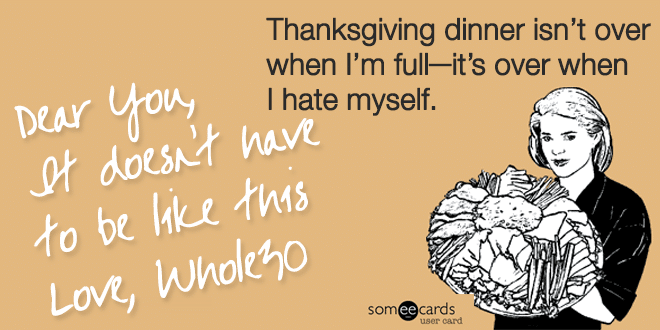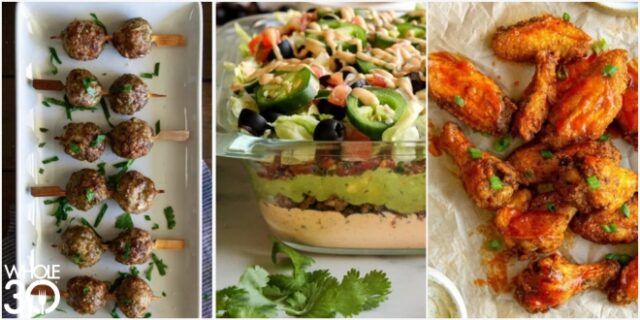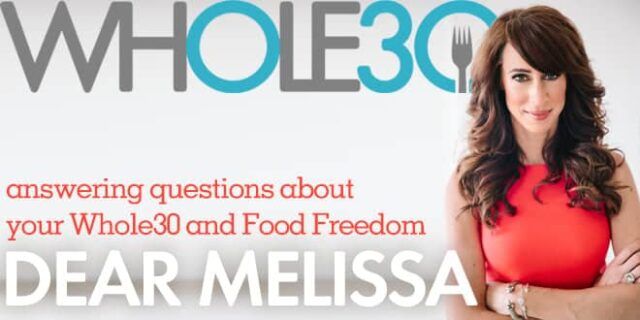by Whole30 co-founder Melissa Urban, who doesn’t understand why a perfectly good sweet potato needs marshmallows anyway Last Thursday was U.S. Thanksgiving, a family and food-centric celebration kicking off what is generally known as “the holiday season.” Earlier in the week, my social media feeds were full of articles from all the big national outlets detailing their best Thanksgiving day strategies, all geared towards keeping you from over-consuming. The tone of most of them was… pessimistic, to say the least. The articles might as well have read, “Here are some things you can do to keep from stuffing your face until you hate yourself for as long as humanly possible, even though we all know you’re going to end up stuffing your face until you hate yourself.” To be fair, the advice given was generally good. Don’t show up to the event hungry. Get in some exercise during the day (often described as “create a caloric deficit before you sit down to dinner”). Be discerning at the table—only eat the things that you think are really going to be worth it. Eat smaller portions. Don’t eat mindlessly. Don’t drink too much alcohol. Wear tight pants so you’re less tempted to over-eat. This is solid advice. (Well, not that last one. That just sounds uncomfortable.) But it’s all given with the strong implication that we will all be rushing to the table frothing at the mouths, barely able to hold ourselves back from double-fisting slices of pie, bathing in gravy, and stuffing buttered dinner rolls down our pants for later. In all honesty, this used to be me. (Well, not the rolls-down-the-pants part. Mostly because I always wore my tightest pants.) I’d stay on my low-fat calorie-counted diet, working out six days a week and resisting all temptations in the name of being healthy. But come Thanksgiving, I’d tell myself I deserved to indulge. That I only see some of these favorite desserts once a year. That I’ve been working so hard for exactly this kind of situation. But mostly, I didn’t rationalize at all because my calorie-and-energy-starved body and willpower-depleted brain took over and turned me into a pie-eating zombie. That was a long time ago. This year, as I skimmed through these “get ready for Turkey Day” articles, I didn’t really think anything. I didn’t take notes, I didn’t worry about my “pre-Thanksgiving strategy,” I didn’t calculate how many calories I’d need to burn to afford that extra dinner roll. I may as well have been reading an article on goat breeding. Or Ruby on Rails. Or sportsing. I had zero interest. Because for the last few years, Thanksgiving has been just another day. I mean, it’s a special day, but not because I allow myself to pig out for the first time since Halloween. It’s because I have the day off and get to see family and friends and share a delicious meal with them. But I have no strategy, because I don’t need one. After five-plus years of doing the Whole30 and living a Whole9 life, events like this are just another opportunity for me to do what I always do—evaluate my food opportunities, decide what’s worth it based on how I know particular foods make me feel, and then make a conscious, deliberate decision about what to eat. My plate changes from year to year, because my awareness changes the more experience I have with the program, but that’s what I’ve been doing since my first Whole30. This year, I went to the gym in the morning not to burn extra calories, but because it was Thursday and Thursday is a training day. I ate a hearty breakfast (a three-egg vegetable omelet, bacon, and fruit salad) not to take up room in my stomach, but because I always eat breakfast. I wore tight pants not to deter me from eating too much, but because my favorite jeans just happen to be skinny. (High-waisted, with lots of stretch, though. I’m no dummy.) We were invited to dinner at a friend’s house. I ate lots of turkey (naturally), but passed on the gravy—it was thickened with flour, and gravy’s not my thing. I ate the butter-and cream-soaked mashed potatoes with glee, enjoyed a delicious Moroccan-spiced rice dish with apples, pear, quince, and pecans, but passed on the homemade rolls because I didn’t want to take up room in my stomach that could be used for homemade cranberry sauce. I ate so much cranberry sauce. I skipped dessert entirely, but came home and had a few bites of pumpkin pie my sweet assistant hand-made for us. It contained gluten, but that pie was my thing. It was delicious. And then I went to bed, and woke up, and went to the gym because Friday is a training day, and ate eggs and spinach and potatoes for breakfast because I always eat breakfast, and made buffalo chicken salad for dinner because we were too stupid to ask our host for leftovers. That’s what a few rounds of Whole30 (and practicing your new, healthy habits between programs) will do for you. You’ll never again have to plan a holiday “strategy.” You’ll never again try to trick yourself into eating less, use up all your willpower before the second course is served, or leave the table feeling full of stuffing and shame. (For the record, there is nothing shameful about eating food, ever, but don’t we put that on ourselves when we feel like we lose control?) This is called “food freedom,” and it’s the one thing Whole30 participants consistently describe as a benefit of the program. So for those of you considering joining us for a site-wide Whole30 on January 1st, welcome. Read more of our articles, introduce yourself on our Forum, and stay tuned later this week as we announce some new resources for you. But more important, know that you’ve read your very last “Plan your Thanksgiving strategy” article, because next year will be different. Welcome to the Whole30.
 Melissa Urban is a Certified Sports Nutritionist, an RKC-Certified Kettlebell instructor, and the author of the New York Times bestselling book It Starts With Food. She co-founded Whole9 and the Whole30 program in 2009, and has been featured in the Wall Street Journal, Details, and Women’s World. She lives in Salt Lake City, UT. Photo credit: Jordan Ison
Melissa Urban is a Certified Sports Nutritionist, an RKC-Certified Kettlebell instructor, and the author of the New York Times bestselling book It Starts With Food. She co-founded Whole9 and the Whole30 program in 2009, and has been featured in the Wall Street Journal, Details, and Women’s World. She lives in Salt Lake City, UT. Photo credit: Jordan Ison
















